Home | Category: Economic, Agriculture and Trade
PROPERTY IN MESOPOTAMIA
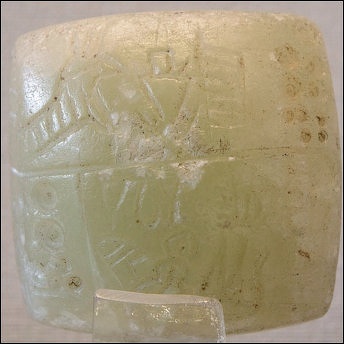
pre-Sumerian sale of a field
Claude Hermann and Walter Johns wrote in the Encyclopedia Britannica:“The god of a city was originally owner of its land, which encircled it with an inner ring of irrigable arable land and an outer fringe of pasture, and the citizens were his tenants. The god and his viceregent, the king, had long ceased to disturb tenancy, and were content with fixed dues in naturalia, stock, money or service. One of the earliest monuments records the purchase by a king of a large estate for his son, paying a fair market price and adding a handsome honorarium to the many owners in costly garments, plate, and precious articles of furniture. [Source: Claude Hermann Walter Johns, Babylonian Law — The Code of Hammurabi. Eleventh Edition of the Encyclopedia Britannica, 1910-1911 ]
The Hammurbai Code “recognizes complete private ownership in land, but apparently extends the right to hold land to votaries, merchants (and resident aliens?). But all land was sold subject to its fixed charges. The king, however, could free land from these charges by charter, which was a frequent way of rewarding those who deserved well of the state. It is from these charters that we learn nearly all we know of the obligations that lay upon land. The state demanded men for the army and the corvee as well as dues in kind.
“A definite area was bound to find a bowman together with his linked pikeman (who bore the shield for both) and to furnish them with supplies for the campaign. This area was termed "a bow" as early as the 8th century B.C., but the usage was much earlier. Later, a horseman was due from certain areas. A man was only bound to serve so many (six?) times, but the land had to find a man annually. The service was usually discharged by slaves and serfs, but the amelu (and perhaps the muskenu) went to war. The "bows" were grouped in tens and hundreds. The corvee was less regular. The letters of Hammurabi often deal with claims to exemption. Religious officials and shepherds in charge of flocks were exempt. Special liabilities lay upon riparian owners to repair canals, bridges, quays, etc.
RECOMMENDED BOOKS:
“Agriculture and the State in Ancient Mesopotamia: An Introduction to Problems of Land Tenure” by Maria deJ. Ellis (1976) Amazon.com;
“Assyrian Deeds And Documents: Recording The Transfer Of Property. Including The So-called Private Contracts, Legal Decisions And Proclamations ... Museum - Chiefly Of The 7th Century B.C (2015) by Agnes Sophia Griffith Johns Amazon.com;
“Assyrian Deeds and Documents Recording the Transfer of Property: Including the so-called private contracts, legal decisions and proclamations ... chiefly of the 7th Century B.C., Vol. 2" by Claude Hermann Walter Johns (2017) Amazon.com;
“Selected Business Documents On the Neo-Babylonian Period” by Ungnad Arthur (2022) Amazon.com;
“Neo-Babylonian Letters and Contracts from the Eanna Archive” (Yale Oriental Series: Cuneiform Texts) by Eckart Frahm and Michael Jursa (2011) Amazon.com;
“The Rental Houses in the Neo-Babylonian Period (VI-V Centuries BC)” by Stefan Zawadzki (2018) Amazon.com;
“Mesopotamia: The Invention of the City“ by Gwendolyn Leick (2001) Amazon.com;
“Ancient Kanesh: A Merchant Colony in Bronze Age Anatolia” by Mogens Trolle Larsen (2015) Amazon.com;
“Women of Assur and Kanesh: Texts from the Archives of Assyrian Merchants” by Cécile Michel (2020) Amazon.com
“Trade and Finance in Ancient Mesopotamia” by J. G. Dercksen (1999) Amazon.com;
“Gods, Kings, and Merchants in Old Babylonian Mesopotamia by D Charpin (2015) Amazon.com;
“Early Mesopotamia: Society and Economy at the Dawn of History” by Nicholas Postgate (1994) Amazon.com;
“Economy and Society of Ancient” Mesopotamia (Studies in Ancient Near Eastern Records) by Steven Garfinkle and Gonzalo Rubio (2025) Amazon.com;
“Economic Life at the Dawn of History in Mesopotamia and Ancient Egypt: The Birth of Market Economy in the Third and Early Second Millennia BCE” by Refael (Rafi) Benvenisti and Naftali Greenwood (2024) Amazon.com;
“The Babylonian Woe; a Study of the Origin of Certain Banking Practices and of Their Effect on the Events of Ancient History Written in the Light of the Present Day” by David Astle | (1975) Amazon.com;
“Ledgers and Prices: Early Mesopotamian Merchant Accounts” by Daniel C. Snell (1982) Amazon.com;
“Everyday Life in Ancient Mesopotamia” by Jean Bottéro (2001) Amazon.com;
“Handbook to Life in Ancient Mesopotamia” by Stephen Bertman (2002) Amazon.com;
“Everyday Life in Babylon and Assyria” by Georges Contenau (1954) Amazon.com;
“The Babylonian World” by Gwendolyn Leick (2007) Amazon.com;
Ownership of Property the Hammurabi Code
Claude Hermann and Walter Johns wrote in the Encyclopedia Britannica: “The Code recognizes many ways of disposing of property — sale, lease, barter, gift, dedication, deposit, loan, pledge, all of which were matters of contract. Sale was the delivery of the purchase (in the case of real estate symbolized by a staff, a key, or deed of conveyance) in return for the purchase money, receipts being given for both. Credit, if given, was treated as a debt, and secured as a loan by the seller to be repaid by the buyer, fr which he gave a bond. [Source: Claude Hermann Walter Johns, Babylonian Law — The Code of Hammurabi. Eleventh Edition of the Encyclopedia Britannica, 1910-1911 ]
“The Code admits no claim unsubstantiated by documents or the oath of witnesses. A buyer had to convince himself of the seller's title. If he bought (or received on deposit) from a minor or a slave without power of attorney, he would be executed as a thief. If the goods were stolen and the rightful owner reclaimed them, he had to prove his purchase by producing the seller and the deed of sale or witnesses to it. Otherwise he would be adjudged a thief and die. If he proved his purchase, he had to give up the property but had his remedy against the seller or, if he had died, could reclaim five-fold from his estate. A man who bought a slave abroad, might find that he had been stolen or captured from Babylonia, and he had to restore him to his former owner without profit. If he bought property belonging to a feudal holding, or to a ward in chancery, he had to return it and forfeit what he gave for it as well. He could repudiate the purchase of a slave attacked by the bennu sickness within the month (later, a hundred days), and had a female slave three days on approval. A defect of title or undisclosed liability would invalidate the sale at any time.
“Landowners frequently cultivated their land themselves but might employ a husbandman or let it. The husbandman was bound to carry out the proper cultivation, raise an average crop and leave the field in good tilth. In case the crop failed the Code fixed a statutory return. Land might be let at a fixed rent when the Code enacted that accidental loss fell on the tenant. If let on share-profit, the landlord and tenant shared the loss proportionately to their stipulated share of profit. If the tenant paid his rent and left the land in good tilth, the landlord could not interfere nor forbid subletting. Waste land was let to reclaim, the tenant being rent-free for three years and paying a stipulated rent in the fourth year. If the tenant neglected to reclaim the land the Code enacted that he must hand it over in good tilth and fixed a statutory rent. Gardens or plantations were let in the same ways and under the same conditions; but for date-groves four years' free tenure was allowed. The metayer system was in vogue, especially on temple lands. The landlord found land, labour, oxen for ploughing and working the watering-machines, carting, threshing or other implements, seed corn, rations for the workmen and fodder for the cattle. The tenant, or steward, usually had other land of his own. If he stole the seed, rations or fodder, the Code enacted that his fingers should be cut off. If he appropriated or sold the implements, impoverished or sublet the cattle, he was heavily fined and in default of payment might be condemned to be torn to pieces by the cattle on the field. Rent was as contracted.
Payment and Debt in the Hammurabi Code
Claude Hermann and Walter Johns wrote in the Encyclopedia Britannica:“In commercial matters, payment in kind was still common, though the contracts usually stipulate for cash, naming the standard expected, that of Babylon, Larsa, Assyria, Carchemish, etc. The Code enacted, however, that a debtor must be allowed to pay in produce according to statutory scale. If a debtor had neither money nor crop, the creditor-must not refuse goods. [Source: Claude Hermann Walter Johns, Babylonian Law — The Code of Hammurabi. Eleventh Edition of the Encyclopedia Britannica, 1910-1911 ]
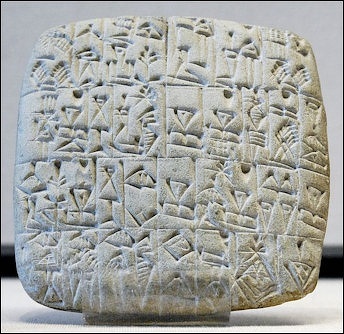
Bill of sale
“Payment through a banker or by written draft against deposit was frequent. Bonds to pay were treated as negotiable. Interest a was rarely charged on advances by the temple or wealthy land-owners for pressing needs, but this may have been part of the metayer system. The borrowers may have been tenants. Interest was charged at very high rates for overdue loans of this kind. Merchants (and even temples in some cases) made ordinary business loans, charging from 20 to 30 percent.
“Debt was secured on the person of the debtor. Distraint on a debtor's corn was forbidden by the Code; not only must the creditor give it back, but his illegal action forfeited his claim altogether. An unwarranted seizure for debt was fined, as was the distraint of a working ox. The debtor being seized for debt could nominate as mancipium or hostage to work off the debt, his wife, a child, or slave. The creditor could only hold a wife or child three years as mancipium. If the mancipium died a natural death while in the creditor's possession no claim could lie against the latter; but if he was the cause of death by cruelty, he had to give son for son, or pay for a slave. He could sell a slave-hostage, unless she were a slave-girl who had borne her master children. She had to be redeemed by her owner.
“The debtor could also pledge his property, and in contracts often pledged a field house or crop. The Code enacted, however, that the debtor should always take the crop himself and pay the creditor from it. If the crop failed, payment was deferred and no interest could be charged for that year. If the debtor did not cultivate the field himself he had to pay for the cultivation, but if the cultivation was already finished he must harvest it himself and pay his debt from the crop. If the cultivator did not get a crop this would not cancel his contract. Pledges were often made where the intrinsic value of the article was equivalent to the amount of the debt; but antichretic pledge was more common, where the profit of the pledge was a set-off against the interest of the debt. The whole property of the debtor might be pledged as security for the payment of the debt, without any of it coming into the enjoyment of the creditor. Personal guarantees were often given that the debtor would repay or the guarantor become liable himself.”
Sales and Purchases Contracts from Mesopotamia in 2000 B.C.
Contract for the Sale of Real Estate, Sumer, c. 2000 B.C.: “This is a transaction from the last days of Sumerian history. It exhibits a form of transfer and title which has a flavor of modern business method about it: “Sini-Ishtar, the son of Ilu-eribu, and Apil-Ili, his brother, have bought one third Shar of land with a house constructed, next the house of Sini-Ishtar, and next the house of Minani; one third Shar of arable land next the house of Sini-Ishtar, which fronts on the street; the property of Minani, the son of Migrat-Sin, from Minani, the son of Migrat-Sin. They have paid four and a half shekels of silver, the price agreed. Never shall further claim be made, on account of the house of Minani. By their king they swore. (The names of fourteen witnesses and a scribe then follow.) Month Tebet, year of the great wall of Karra-Shamash.” [Source: George Aaron Barton, "Contracts," in Assyrian and Babylonian Literature: Selected Transactions, With a Critical Introduction by Robert Francis Harper (New York: D. Appleton & Company, 1904), pp. 256-276, Internet Ancient History Sourcebook: Mesopotamia]
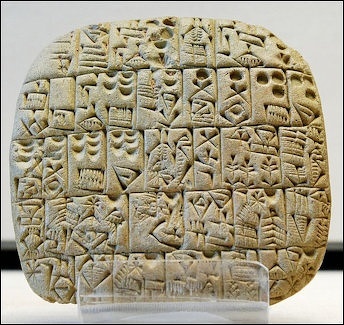
Sales contract
Contract for the Sale of a Standing Crop, Seventh year of Cyrus, 532 B.C.: This contract belongs to a class intermediate between rental and the sale of land. Instead of either, the standing crop is sold.: “From a cultivated field which is situated on the alley of Li'u-Bel, Itti-Marduk-balatu, the son of Nabu-akhi-iddin, the son of Egibi, has made a purchase from Tashmitum-damqat, daughter of Shuzubu, son of Shigua, and Nadin-aplu, the son of Rimut, son of Epish-Ilu. Itti-Marduk-balatu has counted the money, the price of the crop of that field for the seventh year of Cyrus, King of Babylon, king of countries, into the hands of Tashmitum-damqat and Nadin-aplu. (The names of two witnesess and a scribe then follow) Babylon, Ululu thirteenth, the seventh year of Cyrus.
Contract for the Sale of Dates, Thirty-second year of Darius, 490 B.C.: Shibtu, the place of this transaction, was a suburb of Babylon. This shows how women, especially of the lower rank, carried on business for themselves. The father of Aqubatum, as his name, Aradya [ "my slave"] shows, had been a slave. “One talent one qa of dates from the woman Nukaibu daughter of Tabnisha, and the woman Khamaza, daughter of ___, to the woman Aqubatum, daughter of Aradya. In the month Siman they will deliver one talent one qa of dates. Scribe, Shamash-zir-epish, son of Shamash-malku. Shibtu, Adar the sixth, thirty-second year of Darius, King of Babylon and countries.”
Contract for the Sale of Wheat, Thirty-fifth year of Darius, 487 B.C.: This tablet is a good illustration of the simple transactions in food-stuffs, of which we have many, and of which one or two additional examples are given below. The farmers usually contracted as in this document the sale of their produce far in advance of the harvest. In this instance the sale was made six months before the grain would be ripe and could be delivered. Six talents of wheat from Shamash-malku, son of Nabu-napshat-su-ziz, to Shamash-iddin, son of Rimut. In the month Siman, wheat, six talents in full, he will deliver in Shibtu, at the house of Shamash-iddin. Witnesses: Shamash-iddin, son of Nabu-usur-napishti; Abu-nu-emuq, son of Sin-akhi-iddin; Sharru-Bel, son of Sin-iddin; Aban-nimiqu-rukus, son of Malula. Scribe, Aradya, son of Epish-zir. Shibtu, eleventh of Kislimu, thirty-fifth year of Darius king of countries.
Rental Contracts from Mesopotamia in 2000 B.C.
Contract for Rent a House, One Year Term, c. 2000 B.C.: This is the simplest form of rental, and comes from the early Babylonian times.”Akhibte has taken the house of Mashqu from Mashqu, the owner, on a lease for one year. He will pay one shekel of silver, the rent of one year. On the fifth of Tammuz he takes possession. (Then follow the names of four witnesses.) Dated the fifth of Tammuz, the year of the wall of Kar-Shamash.” [Source: George Aaron Barton, "Contracts," in Assyrian and Babylonian Literature: Selected Transactions, With a Critical Introduction by Robert Francis Harper (New York: D. Appleton & Company, 1904), pp. 256-276, Internet Ancient History Sourcebook: Mesopotamia]
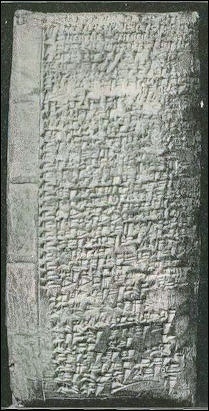
division of property contract
Contract for Rent & Repair of a House, One Year Term, Thirty-fifth year of Darius, 487 B.C.: This contract is most interesting. Iskhuya, apparently a tenant of Shamash-iddin, undertakes to repair the house in which he is living. In addition to the rent for the year he is to receive fifteen shekels in money, in two payments, at the beginning and the completion of the work. The last payment is to be made on the day of Bel, which seems to be identical with the first of Tebet, a week later than the contract was made. In case the repairs were not then completed, Iskhuya was to forfeit four shekels. Such business methods are not, therefore, altogether modern.
“In addition to the rent of the house of Shamash-iddin, son of Rimut, for this year, fifteen shekels of money in cash (shall go) to Iskhuya, son of Shaqa-Bel, son of the priest of Agish. Because of the payment he shall repair the weakness (of the house), he shall close up the crack of the wall. He shall pay a part of the money at the beginning, a part of the money at the completion. He shall pay it on the day of Bel, the day of wailing and weeping, In case the house is unfinished by Iskhuya after the first day of Tebet, Shamash-iddin shall receive four shekels of money in cash into his possession at tne hands of Iskhuya. (The names of three witnesses and a scribe then follow.) Dated at Shibtu, the twenty-first of Kislimu, the thirty-fifth year of Darius.”
Contract for Lease of Real Estate, 60 Year Term, Thirty-sixth year of Artaxerxes, 428 B.C.: This complicated contract is of unusual interest, since the lease is for so long a period; the rent is paid in advance, and the lessee is in the same instrunnent guaranteed against all future contingencies. “Baga'miri, son of Mitradatu, spoke of his own free-will to Belshum-iddin, son of Murashu, saying: "I will lease my cultivated field and uncultivated land, and the cultivated field and uncultivated land of Rushundati, my father's deceased brother, which is situated on the bank of the canal of Sin, and the bank of the canal Shilikhti, and the dwelling houses in the town of Galiya, on the north, adjoining the field of Nabu-akhi-iddin, son of Ninib-iddin, and adjoining the field of Banani-erish, a citizen of Nippur; on the south, adjoining the field of Minu-Bel-dana, son of Balatu; on the east, the bank of the canal of Sin; on the west, the bank of the canal of Shilikhti, and adjoining the field of Rushundati, the overseer of Artaremu---all to use and to plant for sixty years. The rent of the cultivated field will be twenty talents of dates; and the uncultivated field (I will lease) for planting." Afterward Bel-shum-iddin, son of Murashu, accepted his offer with reference to the cultivated field and the uncultivated field, his part and the part of Rushundati, his uncle, deceased; he shall hold for sixty years the cultivated portion of it for a rental of twenty talents of dates per year, and the uncultivated portion for planting. Each year in the month Tishri, Bel-shum-iddin unto Baga'miri will give twenty talents of dates for the use of that field. The whole rent of his field for sixty years Baga'miri, son of Mitradatu, has received from the hands of Bel-shum-iddin, son of Murashu. If, in the future, before sixty years are completed, Baga'miri shall take that field from Bel-shum-iddin, Baga'miri shall pay one talent of silver to Bel-shum-iddin for the work which he shall have done on it and the orchard which he shall have planted. In case any claim should arise against that field, Baga'miri shall settle it and pay instead of Bel-shum-iddin. From the month Nisan, of the thirty-seventh year of Artaxerxes, the king, that field, for use and for planting, shall be in the possession of Bel-shum-iddin, son of Murashu, for sixty years. (The names of thirty witnesses and a scribe follow, eleven of whom left the impressions of their seals on the edges of the tablet. L. 34 states that) the print of the thumb-nail of Baga'miri was placed on the tablet instead of his seal. (L. 37 contains the information that) the tablet was written in the presence of Ekur-belit, daughter of Bel-balatu-ittannu, mother of Baga'miri. (The date is) Nippur, Tishri second, thirty-sixth year of Artaxerxes.”
Co-Partnerships Contracts from Mesopotamia in 2000 B.C.
Contract for Partners to Borrow Money against Harvest, c. 2000 B.C. The two farmers who borrow the money on their crop are partners: Sin-Kalama-idi, son of Ulamasha, and Apil-ilu-shu, Son of Khayamdidu, have borrowed from Arad-Sin sixteen shekels of money for the garnering of the harvest. On the festival of Ab they will pay the wheat. (Names of three witnesses and a scribe follow, and the tablet is dated in the year of a certain flood. It is not stated in the reign of what king it was written, but it clearly is from either the dynasty of Ur III or that of Akkad.” [Source: George Aaron Barton, "Contracts," in Assyrian and Babylonian Literature: Selected Transactions, With a Critical Introduction by Robert Francis Harper (New York: D. Appleton & Company, 1904), pp. 256-276, Internet Ancient History Sourcebook: Mesopotamia]
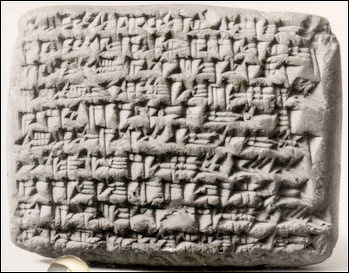
proxy contract for the purchase of a slave
Contract for a Partnership, Thirty-sixth year of Nebuchadnezzar II, 568 B.C.: “Nabu-akhi-iddin was an investor---a member of the great Egibi family. He contributed four manas of capital to this enterprise, while Bel-shunu, who was to carry on the business, contributed one half mana and seven shekels, whatever property he might have, and his time. His expenses in the conduct of the business up to four shekels may be paid from the common funds. Two manas of money belonging to Nabu-akhi-iddin, son of Shula, son of Egibi, and one half mana seven shekels of money belonging to Bel-shunu, son of Bel-akhi-iddin, Son of Sin-emuq, they have put into a copartnership with one another. Whatever remains to Bel-shunu in town or country over and above, becomes their common property. Whatever Bel-shunu spends for expenses in excess of four shekels of money shall be considered extravagant. (The contract is witnessed by three men and a scribe, and is dated at) Babylon, first of Ab, in the thirty-sixth year of Nebuchadnezzar.”
Contract for a Partnership, Fortieth year of Nebuchadnezzar II, 564 B.C.: From this document we learn that Iddin-Marduk and Nabu-ukin formed a copartnership in the month Tebet, of Nebuchadnezzar's fortieth year. A year from that date each of the partners drew out twenty shekels. In the month Ulul of the next year a number of small amounts were delivered to Iddin-Marduk for various specific purposes, and a larger amount, perhaps in payment of an obligation of the firm, was paid to two other men.
“Memorandum of the shares of Iddin-Marduk and Nabu-ukin, from the month Tebet, of the fortieth year of Nebuchadnezzar, King of Babylon, unto the month Markheswan, of the forty-second year. One third mana of money Iddin-Marduk drew on his account in the month Tebet, of the forty-first year. One third mana of money Nabu-ukin drew on his account in the month Tebet, of the forty-first year. Fifteen shekels of Nabu-ukin's money, coined in shekel pieces, from __ was given to Iddin-Marduk for the house of Limniya on the fifteenth of Ulul, of the forty-second year; a fourth shekel of coined money, which was for a nutu-skin, given into the same hands. One half shekel of money was given for palipi naskhapu; one third of a shekel of money was given into the same hands for beef; two giri of money was given for meat; one shekel of money was given for Lisi-nuri; two shekels of money, which was for Karia, was given into the same hands. City of __, Markheswan ___. One mana fifty shekels are counted into the possession of Lishiru and Bunini-epish.”
Laws Protecting Businesses
Morris Jastrow said: “Coming to the commercial regulations of the Code, the fundamental principle underlying them is the fixing of responsibility where it belongs, and the protecting of both parties to a transaction not only against fraud on either side, but also against unforeseen circumstances. It is somewhat significant that, although many of the laws deal with cases of wilful fraud or deceit in one party, the general assumption is that both parties are actuated by honest motives, and that difficulties often arise through no fault of either, being due to the growing complications of business activities. As a protection to buyer and seller or to any two contracting parties, it is stipulated that there must be a written contract in the presence of witnesses. No claim can be made unless a contract can be found, and the assumption is that failure to produce witnesses in case of a claim is proof of attempted fraud. An interesting case is mentioned in a series of paragraphs, of one who asserts that he has lost an article belonging to him, which he finds in the possession of another, which, however, the latter maintains that he has bought. [Source: Morris Jastrow, Lectures more than ten years after publishing his book “Aspects of Religious Belief and Practice in Babylonia and Assyria” 1911]
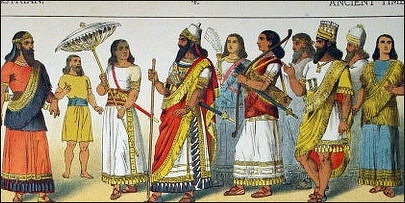
“The point is to find the guilty party. The purchaser must bring into court the vendor and witnesses to the sale, and he who claims the property must bring witnesses to establish his claim. If both sets of witnesses appear and their testimony is shown to be true, the vendor of the property adjudged to be lost is revealed as the thief and is put to death, this severer punishment being inflicted because the aggravating factor of fraud is added to theft. The article is restored to the lawful owner, and the innocent purchaser is compensated out of the estate of the thief and fraudulent vendor. If the purchaser fail to produce the vendor and witnesses to the sale, and the claimant brings witnesses to prove his property, then the purchaser is put to death as the real thief, and the stolen article is restored to its lawful owner. If, on the other hand, the claimant cannot bring witnesses to prove his property, then he is considered to have made a fraudulent claim, and suffers the penalty of death. If the vendor—prove to be such—has meanwhile died, the amount is nevertheless to be restored to the purchaser out of the estate of the vendor. Finally, the law allows a term of six months within which to produce the witnesses in case they are not at once accessible.
“According to the ethical principles governing the Code, the directors of a bank would be responsible to the depositors for losses incurred through the business transactions of the bank. The protection of the debtor in business transactions against the tyranny of the creditor is carried almost to an extreme; it would appear that the creditor cannot attach the property of his debtor without obtaining the authority of the court; and if. e. g., he has helped himself from the granary of the debtor without the latter’s permission, although he may not have taken more than the amount of the debt, he must return what he has taken, and by his wilful act forfeits his original claim. The courts regulated the hire of cattle for ploughing or other purposes, the wages of mechanics and labourers, the hire of ships for freight, the amount of the return for the farming of fields, and even the fee of surgeons for operations—all with a view to affording protection against both extortion and underpayment.
Hammurabi's Code of Laws: 100-112: Merchants and Tavern and Inn-Keepers
The Babylonian king Hammurabi (1792-1750 B.C.) is credited with producing the Code of Hammurabi, the oldest surviving set of laws. Recognized for putting eye for an eye justice into writing and remarkable for its depth and judiciousness, it consists of 282 case laws with legal procedures and penalties. Many of the laws had been around before the code was etched in the eight-foot-highin black diorite stone that bears them. Hammurabi codified them into a fixed and standardized set of laws. [Source: Translated by L. W. King]
. . . interest for the money, as much as he has received, he shall give a note therefor, and on the day, when they settle, pay to the merchant.
If there are no mercantile arrangements in the place whither he went, he shall leave the entire amount of money which he received with the broker to give to the merchant.
If a merchant entrust money to an agent (broker) for some investment, and the broker suffer a loss in the place to which he goes, he shall make good the capital to the merchant.
If, while on the journey, an enemy take away from him anything that he had, the broker shall swear by God and be free of obligation.
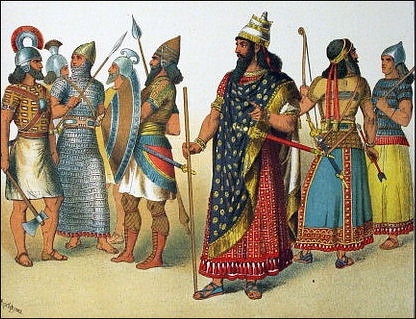
If a merchant give an agent corn, wool, oil, or any other goods to transport, the agent shall give a receipt for the amount, and compensate the merchant therefor. Then he shall obtain a receipt form the merchant for the money that he gives the merchant.
If the agent is careless, and does not take a receipt for the money which he gave the merchant, he can not consider the unreceipted money as his own.
If the agent accept money from the merchant, but have a quarrel with the merchant (denying the receipt), then shall the merchant swear before God and witnesses that he has given this money to the agent, and the agent shall pay him three times the sum.
If the merchant cheat the agent, in that as the latter has returned to him all that had been given him, but the merchant denies the receipt of what had been returned to him, then shall this agent convict the merchant before God and the judges, and if he still deny receiving what the agent had given him shall pay six times the sum to the agent.
If a tavern-keeper (feminine) does not accept corn according to gross weight in payment of drink, but takes money, and the price of the drink is less than that of the corn, she shall be convicted and thrown into the water.
If conspirators meet in the house of a tavern-keeper, and these conspirators are not captured and delivered to the court, the tavern-keeper shall be put to death.
If a "sister of a god" open a tavern, or enter a tavern to drink, then shall this woman be burned to death.
If an inn-keeper furnish sixty ka of usakani-drink to . . . she shall receive fifty ka of corn at the harvest.
- If any one be on a journey and entrust silver, gold, precious stones, or any movable property to another, and wish to recover it from him; if the latter do not bring all of the property to the appointed place, but appropriate it to his own use, then shall this man, who did not bring the property to hand it over, be convicted, and he shall pay fivefold for all that had been entrusted to him.
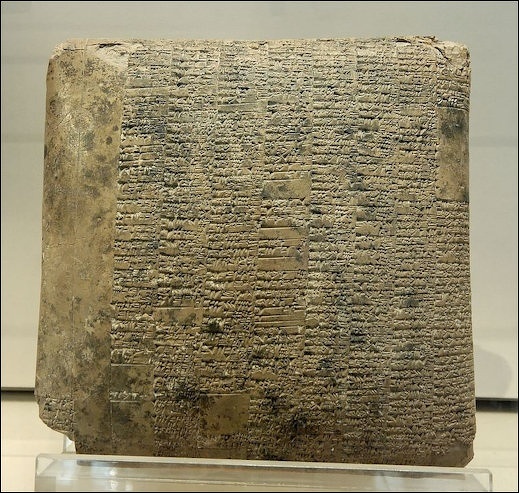
Balance sheet from Sumer
Hammurabi's Code of Laws: 113-126: Claims and Debts
If any one have consignment of corn or money, and he take from the granary or box without the knowledge of the owner, then shall he who took corn without the knowledge of the owner out of the granary or money out of the box be legally convicted, and repay the corn he has taken. And he shall lose whatever commission was paid to him, or due him. [Source: Translated by L. W. King]
If a man have no claim on another for corn and money, and try to demand it by force, he shall pay one-third of a mina of silver in every case.
If any one have a claim for corn or money upon another and imprison him; if the prisoner die in prison a natural death, the case shall go no further.
If the prisoner die in prison from blows or maltreatment, the master of the prisoner shall convict the merchant before the judge. If he was a free-born man, the son of the merchant shall be put to death; if it was a slave, he shall pay one-third of a mina of gold, and all that the master of the prisoner gave he shall forfeit.
If any one fail to meet a claim for debt, and sell himself, his wife, his son, and daughter for money or give them away to forced labor: they shall work for three years in the house of the man who bought them, or the proprietor, and in the fourth year they shall be set free.
If he give a male or female slave away for forced labor, and the merchant sublease them, or sell them for money, no objection can be raised.
If any one fail to meet a claim for debt, and he sell the maid servant who has borne him children, for money, the money which the merchant has paid shall be repaid to him by the owner of the slave and she shall be freed.
If any one store corn for safe keeping in another person's house, and any harm happen to the corn in storage, or if the owner of the house open the granary and take some of the corn, or if especially he deny that the corn was stored in his house: then the owner of the corn shall claim his corn before God (on oath), and the owner of the house shall pay its owner for all of the corn that he took.
If any one store corn in another man's house he shall pay him storage at the rate of one gur for every five ka of corn per year.
If any one give another silver, gold, or anything else to keep, he shall show everything to some witness, draw up a contract, and then hand it over for safe keeping.
If he turn it over for safe keeping without witness or contract, and if he to whom it was given deny it, then he has no legitimate claim.
If any one deliver silver, gold, or anything else to another for safe keeping, before a witness, but he deny it, he shall be brought before a judge, and all that he has denied he shall pay in full.
If any one place his property with another for safe keeping, and there, either through thieves or robbers, his property and the property of the other man be lost, the owner of the house, through whose neglect the loss took place, shall compensate the owner for all that was given to him in charge. But the owner of the house shall try to follow up and recover his property, and take it away from the thief.
If any one who has not lost his goods state that they have been lost, and make false claims: if he claim his goods and amount of injury before God, even though he has not lost them, he shall be fully compensated for all his loss claimed. (I.e., the oath is all that is needed.)
Loans and Mortgages Contracts from Mesopotamia in 611 B.C.

tablet with accounts from Ur around 2000 BC
Contract for Loan of Money, Fourteenth year of Nabopolassar, 611 B.C. This is a mortgage on real estate in security for a loan. The interest was at the rate of eleven and one-third per cent: “One mana of money, a sum belonging to Iqisha-Marduk, son of Kalab-Sin, (is loaned) unto Nabu-etir, son of __, son of __. Yearly the amount of the mana shall increase its sum by seven shekels of money. His field near the gate of Bel is Iqisha-Marduk's pledge. (This document bears the name of four witnesses, and is dated) at Babylon, Tammuz twenty-seventh, in the fourteenth year of Nabopolassar, (the father of Nebuchadnezzar).” [Source: George Aaron Barton, "Contracts," in Assyrian and Babylonian Literature: Selected Transactions, With a Critical Introduction by Robert Francis Harper (New York: D. Appleton & Company, 1904), pp. 256-276, Internet Ancient History Sourcebook: Mesopotamia]
Contract for Loan of Money, Sixth year of Nebuchadnezzar II, 598 B.C.: The rate of interest in this case was thirteen and one-third per cent. “One mana of money, a sum belonging to Dan-Marduk, son of Apla, son of the Dagger-wearer, (is loaned) unto Kudurru, son of Iqisha-apla, son of Egibi. Yearly the amount of the mana shall increase its sum by eight shekels of money. Whatever he has in city or country, as much as it may be, is pledged to Dan-Marduk. (The date is) Babylon, Adar fourth, in Nebuchadnezzar's sixth year.”
Contract for Loan of Money, Fifth year of Nabonidus, 550 B.C. This loan was made Aru third, in the fifth year of Nabonidus. No security was given the creditor, but he received an interest of twenty per cent: “One and a half manas of money belonging to Iddin-Marduk, son of Iqisha-apla, son of Nur-Sin, (is loaned) unto Ben-Hadad-natan, son of Addiya and Bunanit, his wife. Monthly the amount of a mana shall increase its sum by a shekel of money. From the first of the month Siman, of the fifth year of Nabonidus, King of Babylon, they shall pay the sum on the money. The call shall be made for the interest money at the house which belongs to Iba. Monthly shall the sum be paid.”
Bankruptcy Contracts from Mesopotamia in 560 B.C.
Contract for Purchase of Mortgage, Second year of Evil-Merodach, 560 B.C. It exhibits how in a case of bankruptcy the interests of the creditor were conserved in the sale of the mortgaged property. It also proves that in Babylonian law the value of the estate was not in such cases sacrificed to the creditor, but that the debtor could obtain the equity in his property which actually belonged to him. [Source: George Aaron Barton, "Contracts," in Assyrian and Babylonian Literature: Selected Transactions, With a Critical Introduction by Robert Francis Harper (New York: D. Appleton & Company, 1904), pp. 256-276, Internet Ancient History Sourcebook: Mesopotamia]
“Two thirds of a mana of money, a loan from Bel-zir-epish, son of Shapik-zir, son of the smith, to Nabu-apla-iddin, son of Balatu, son of the _____, a loan upon the Gin (of land) which was delivered unto the creditor, and (on) the house of Nabu-apla-iddin, (which) Nergal-sharra-usur, son of Bel-shum-ishkun, has bought for money. One-third mana of money for the payment wherewith the creditor to be paid Marduk-apla-iddin, son of Bel-zir-epish, son of the smith, has received as agent for Nergal-sharra-usur, from Nabu-akhi-iddin, son of Shula, son of Egibi. The receipt for two-thirds manas (which) Bel-zir-epish (loaned) to Nabu-apla-iddin, Marduk-apla-usur, his son gave to Nergal-sharra-usur. Until Marduk-apla-usur unto the scribes of the king shall speak and shall receive the seal of possession, Nabu-akhi-iddin, son of Nabu-shum-iddins, son of Bel-shuktanu, shall hold the certificate of the receipt of the two thirds manas of money. (This instrument is dated) Babylon, Nisan twenty-sixth, of the second year of Evil-Merodach.”
Contract Purchase of Mortgage, First year of Neriglissar, 559 B.C.issar's accession year. The place is Babylon. The scribe who wrote it, Iqisha-apli's son. A mortgage on the house of Nabu-apla-iddin, which a tablet dated in the reign of Evil-Merodach shows was then held by two persons, had been transferred to the hands of Iqisha-apla. It appears from the present transaction that half of the mortgage had been paid off. Apparently the remaining half could not be paid, and the house was sold. The purchaser was in this case the king, Neriglissar, who had but recently ascended the throne. Like many other regal purchasers he was short of funds, and was compelled to borrow the money from the head of the Egibi firm. The king appears to have taken the house for the sum of twenty-six and a quarter shekels, the half of the loan which remained unpaid, and to have compelled the holder of the mortgage to surrender to the banker all further claim to the property. Might made right in this case, and the equity was lost. [Source: George Aaron Barton, "Contracts," in Assyrian and Babylonian Literature: Selected Transactions, With a Critical Introduction by Robert Francis Harper (New York: D. Appleton & Company, 1904), pp. 256-276, Internet Ancient History Sourcebook: Mesopotamia]
“Fifty-two and a half shekels of money, belonging to Iqisha-apla, son of Gilua, son of Sin-shadunu (are received) from Nabu-apla-iddin, son of Balatu, son of the __, upon the price of the house of Nabu-apla-iddin, which he purchased for cash for the palace. The balance remaining, twenty-six and a quarter shekels of money, Iqisha-apla, son of Gilua, son of Sin-shadunu, has received from the hand of Nabu-akhi-iddin, son of Shula, son of Egibi, and has given the receipt for fifty-two and a half shekels from Nabu-apla-iddin unto Nabu-akhi-iddin.”
Code of the Assyrians (c. 1075 B.C.) on Inheritance and Debt
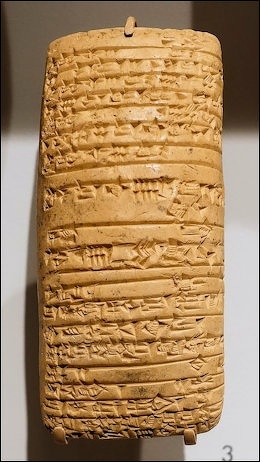
tablet of merchant goods from Ur around 2000 BC
I.26. If a woman be dwelling in the house of her father, and her husband have died, any gift which her husband settled upon her — if there be any sons of her husband's, they shall receive it. If there be no sons of her husband's she receives it. [Source: Internet Ancient History Sourcebook]
I.32. If a woman be dwelling in the house of father, but has been given to her husband, whether she has been taken to the house of her husband or not, all debts, misdemeanors, and crimes of her husband shall she bear as if she too committed them. Likewise if she be dwelling with her husband, all crimes of his shall she bear as well.
I.35. If a woman, who is a widow, enter into the house of a man, whatsoever she brings with her — all is her husband's. But if a man enter in to a woman, whatsoever he brings — all is the woman's.
I.37. If a man divorce his wife, if he wish, he may give her something; if he does not wish, he need not give her anything. Empty shall she go out.
I.46. If a woman whose husband is dead on the death of her husband do not go out from her house, if her husband did not leave her anything, she shall dwell in the house of one of her sons. The sons of her husband shall support her; her food and her drink, as for a fiancee whom they are courting, they shall agree to provide for her. If she be a second wife, and have no sons of her own, with one of her husband's sons she shall dwell and the group shall support her. If she have sons of her own, her own sons shall support her, and she shall do their work. But if there be one among the sons of her husband who marries her, the other sons need not support her.
II.2. If a man among brothers who have not yet divided the paternal estate commit a killing, to the avenger of blood they shall give him. If he choose, he may be spared. His portion in the paternal estate he may seize.
II.6. Before he takes field or house for silver, three times in a month of days the buyer shall make proclamation in the city of Ashur, and three times he shall have proclamation made in the city in which he would buy the field and house. Thus: "Field and house of so-and-so, son of so-and-so, situated in the cultivable area of this city I am buying. Such as are in possession or have no objection, or have any claims on the property, let them bring their tablets, let them lay before the magistrates, let them present their claims, let them prove their title, and let them take what is theirs. Those whl during this month of days cannot bring even one of their tablets to me, lay them before the magistrates, receive in full what belongs to him." If the buyer shall have made proclamation, they shall write their tablets, the magistrates shall give them to him, saying: "In this month of days, the buyer made proclamation three times, He who in this month of days brought not his tablets to me, did not lay them before me, shall forfeit his claim to share in field and house.' To the one making the proclamation, who is a buyer, it shall be free."
II.8. If a man meddle with the field of his neighbor, they shall convict him. Threefold shall he restore. One of his fingers they shall cut off, a hundred blows they shall inflict upon him, one month of days he shall do the king's work.
III.2. If a man sell the son or daughter of a man, who on account of debt was dwelling in his house, they shall convict him, he shall lose his money; and he shall give his minor son to the owner of the property; one hundred lashes shall they inflict upon him, twenty days shall he do the king's work.
Image Sources: Wikimedia Commons
Text Sources: Internet Ancient History Sourcebook: Mesopotamia sourcebooks.fordham.edu , National Geographic, Smithsonian magazine, especially Merle Severy, National Geographic, May 1991 and Marion Steinmann, Smithsonian, December 1988, New York Times, Washington Post, Los Angeles Times, Discover magazine, Times of London, Natural History magazine, Archaeology magazine, The New Yorker, BBC, Encyclopædia Britannica, Metropolitan Museum of Art, Time, Newsweek, Wikipedia, Reuters, Associated Press, The Guardian, AFP, Lonely Planet Guides, “World Religions” edited by Geoffrey Parrinder (Facts on File Publications, New York); “History of Warfare” by John Keegan (Vintage Books); “History of Art” by H.W. Janson Prentice Hall, Englewood Cliffs, N.J.), Compton’s Encyclopedia and various books and other publications.
Last updated July 2024
